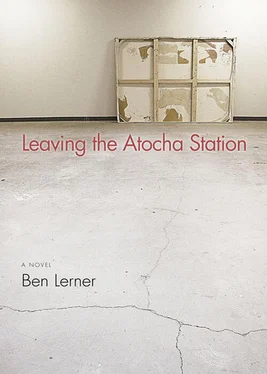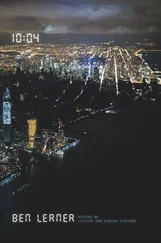Only an hour or two later, when we were leaving the apartment to get dinner, did the fact that I did not in reality know if I was staying in Madrid begin to bother me, and the fact that it took so long for it to bother me also began to bother me. What would Teresa say if I told her I had changed my mind, that I had decided, after all, to return to the States? As we walked back into Chueca, the plaza bustling now in late spring weather, and stood in line for a table at the restaurant, Bazaar, I decided I didn’t care what she’d think; all of this, all of Spain, would cease to be real if I went back; it would be my year abroad, a year cast out of the line of years, a last or nearly last hurrah of juvenility, but it would not, in any serious sense, form part of my life. I would not stay in touch with Teresa or Arturo, not to mention Isabel; I would compose a one- or two-sentence summary of my time in Spain for those who queried me about my experience abroad, but I would otherwise recall a blur of hash and sun and maybe that kid with blood streaming down his face; everything else would be excised. If this didn’t strike me as a ruthless or stupid way to think, that was because I could not believe Teresa would ultimately mind; we would have the chapbook as a memento and she would begin her next project, thinking of me no more and probably less than she thought of Carlos, Abel, whoever that guy was at Rafa’s party, et al. Eventually we were seated, ate things draped in various oils, drank two or three bottles of dry cava, and discussed Gaudí, Topeka, Lorca, New York, Córdoba, Orson Welles. I believed I contributed intelligent things, speaking and understanding effortlessly. We were drunk by the time we finished dinner and as we wound our way back to her apartment I thought to myself, this is wonderful, the life I lead here, no matter if it’s mine.
The two days I spent before the panel, however, were not wonderful, were definitely my own; a low-level but constant panic had come upon me; I couldn’t stop grinding my teeth. Maybe I could just be silent, not say a single word, but use my face to modulate my silence and let that be my contribution; surely the more distinguished panelists would hold forth, hold court. I didn’t answer the buzzer and I didn’t leave the apartment. I wrote out a few sentences of wide applicability with the help of my dictionary and attempted to commit them to memory: “No writer is free to renounce his political moment, but literature reflects politics more than it affects it, an important distinction.” I searched the internet for short quotes from Ortega y Gasset, who I had at one time thought was two people, like Deleuze and Guattari, Calvin and Hobbes. I figured out how to say: “I’m hesitant to speak about the Spanish condition as if I were an expert; to do so would be to fulfill the stereotypes regarding American presumptuousness.” Each time I mangled a quote, I grew more nervous. I was less concerned about exposing my ignorance of Spanish poetry than I was about exposing my ignorance of Spanish period. I might be able to produce several grammatically perfect sentences on the cuff, or is it off, but I might not; better to mimic spontaneous if oblique pronouncements than to rely on real-time fluency.
On the day of the panel I left the apartment almost two hours early. I walked to the foundation’s building, which was not far from Teresa’s, then circled the block, practicing my memorized passages, reminding myself to breathe. I had three tranquilizers in the pocket of my jeans. I put my hand in my pocket to confirm their presence and contact with the denim made me exclaim internally: Why, in the name of God, was I wearing jeans? And worse: a T-shirt. In two days of panicky anticipation I had failed to concern myself with my appearance. I felt nauseated as I imagined the men in suits, María José and the professor in pantsuits; Teresa would appear elegant in whatever she wore. I asked a man at a kiosk for the time; I had a little more than an hour; if I hurried, nearly ran, I could make it. I was telling myself it was a terrible idea to get sweaty and risk being late, but I was telling myself this as I rushed back to my apartment, flew up the stairs, and looked for my suit. Thankfully, and uncharacteristically, I had hung it up after the single time I wore it, and if it wasn’t pressed, it was nevertheless passable. I changed as quickly as I could, checked myself in the mirror, and flew back down the stairs. I slowed down a block from the foundation, wiped the sweat from my face, and tried to catch my breath.
I entered the building and made my way to the auditorium; to my horror, it was considerably larger than I expected, seating perhaps two hundred people, and it was full; I had anticipated a glorified conference room. I saw someone setting up a video camera on a tripod. There was a little stage, and on the stage a table with chairs, placards, a swan-shaped jug of water, glasses, and individual microphones; the stage was intensely illuminated. Four of the six panelists, including Teresa, were already seated, chatting with one another. I hesitated near the door, a little dazed; María José saw me, approached, and said, perhaps sarcastically, that I looked very elegant, then asked me to take my seat. The other fellow, she told me as she walked me toward the stage, was not able to join us. She arranged this, I told myself, enraged; as the only American, I would have to speak and the panelists or audience members would, if only out of politeness, ask me for my “perspective.” I took my place at the table and received Teresa’s smile; she looked no less comfortable on stage than in her living room, although she was wearing some kind of charcoal ensemble that made me glad I’d changed clothes. I tried to smile back and saw the other panelists had pens and paper, presumably to take notes, whereas I had brought nothing, a sign of presumptuousness.

A movie I had never seen.
Soon María José ascended the stage. The crowd quieted down as she walked to a standing microphone I had not seen. She thanked everyone for coming to tonight’s discussion. She then proceeded to introduce the panelists, noting, when she got to me, that a bilingual selection of my poems was shortly forthcoming, and she said we would begin the evening by asking each of the panelists to speak informally for one or two minutes about the topic, “literature now.” We would begin with Javier Torres, who was seated on the end of the table nearest María José, and work our way across; I was second from last.
Again the anger rose inside me; surely María José had told the other panelists to prepare a few minutes of remarks, but had somehow neglected to say as much to me. But as Javier Torres began to speak in his politician’s voice, a voice that fit his headshot perfectly, a voice that sounded like it came not from a body but a screen, my anger was nothing compared to my anxiety; I had no idea what to say. I reached into my pocket for my tranquilizers and realized, no doubt blanching, that I had failed to transfer them to my suit pants from my jeans. I felt a surge of terror so intense I was dizzy; it was like I was looking down into the space between the winding stairs of the Sagrada Familia, a view I’d never seen. Somehow Teresa, next after Javier, was already speaking; soon it would be my turn. The audience was invisible from the stage because of the lights but I could sense its presence, its attentiveness; Teresa made a joke and they laughed and the many-headed laughter was terrible to me. Elena López Portillo was talking now; I wiped the sweat from my brow. If I’d brought paper, I managed to think, I could have composed something coherent. Use your memorized lines, I told myself, but could not remember them. I was going to flee or vomit or faint.
Читать дальше













